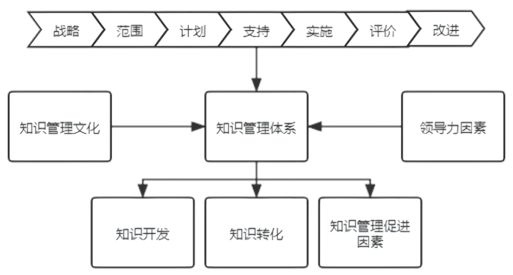 PDF(1356 KB)
PDF(1356 KB)


Knowledge Management International Standard ISO30401 and Implications for the Optimization of China's Enterprise Innovation Ecosystem
Chu Jiewang, Chen Yongyan
Knowledge Management Forum ›› 2022, Vol. 7 ›› Issue (5) : 510-520.
 PDF(1356 KB)
PDF(1356 KB)
 PDF(1356 KB)
PDF(1356 KB)
Knowledge Management International Standard ISO30401 and Implications for the Optimization of China's Enterprise Innovation Ecosystem
[Purpose/Significance] In the current context of economic globalization, innovation ecosystem has become an important driving force to promote enterprise innovation development in China, the article interprets the knowledge management standard ISO30401 released in 2018 and tries to provide ideas for the construction and optimization of the innovation ecosystem of Chinese enterprises. [Method/Process] This paper began with an interpretation of the new global standard for knowledge management, ISO30401, and took the enterprise knowledge management system as an entry point, attempting to introduce the new knowledge management system into the construction of China's innovation ecosystem in terms of the establishment of a knowledge management system, changing the form of knowledge organisation, clarifying leadership roles and responsibilities in enterprise knowledge management, technological and infrastructural innovation and promoting the formation of a knowledge management culture within the enterprise. [Result/Conclusion] Knowledge in the innovation ecosystem flows in a continuous cycle among innovation subjects, the establishment of the knowledge management system will help enterprises to form a systematic and standardized knowledge management ability, effectively use the knowledge cycle, obtain knowledge advantages and competitive advantages, and constantly enhance the innovation ability of enterprises.

knowledge management standard / ISO30401 / innovation ecosystem
| [1] |
MOORE J F. Predators and prey: a new ecology of competition[J].Harvard business review,1993,71(3):75-86.
|
| [2] |
IANSITI M, LEVOEM R. Strategy as ecology[J]. Harvard business review,2004,82(3):68-78,126.
|
| [3] |
ADNER R, KAPOOR R. Value creation in innovation ecosystems: how the structure of technological interdependence affects firm performance in new technology generations[J]. Strategic management journal, 2010,31(3):306-333.
|
| [4] |
WALRAVE B, TALMAR M, PODOYNITSYNA K S, et al. A multi-level perspective on innovation ecosystems for path-breaking innovation[J]. Technological forecasting and social change,2018,136:103-113.
|
| [5] |
DE VASCONCELOS GOMES L A, FACIN A L F, SALERNO M S, et al. Unpacking the innovation ecosystem construct: evolution, gaps and trends[J]. Technological forecasting and social change,2018,136:30-48.
|
| [6] |
GRANSTRAND O, HOLGERSSON M. Innovation ecosystems: a conceptual review and a new definition[J]. Technovation, 2020, 90: 102098.
|
| [7] |
蒋石梅,张玉瑶,王自媛,等.非技术要素对企业创新生态系统的作用机理——以海尔创新生态系统为例[J].技术经济,2018,37(4):29-36,108.
|
| [8] |
王明对, 陈丹霞. 创新主体的知识转移与共享机制——基于创新生态系统的研究[J]. 资源开发与市场, 2019, 35(7):6.
|
| [9] |
BONI A, GUNN M. Building and leveraging the innovation ecosystem and clusters: universities, startups, accelerators, alliances, and partnerships[J].Journal of commercial biotechnology, 2021, 26(1):3-8.
|
| [10] |
KIM J, PAEK B, LEE H. Exploring innovation ecosystem of incumbents in the face of technological discontinuities: automobile firms[J]. Sustainability,2022,14(3):1606.
|
| [11] |
储节旺,朱永,闫士涛.知识管理标准的研究[J].图书情报工作,2010,54(20):100-104,123.
|
| [12] |
储节旺,朱永,闫士涛.关于我国知识管理首个国家标准的几点思考[J].情报理论与实践,2010,33(8):4-7.
|
| [13] |
郭春侠,储节旺,刘伟.国外知识管理标准及对我国的启示[J].情报理论与实践,2010,33(11):39-43.
|
| [14] |
DAN B, GIAT Y.ISO 9001 as a tool for improving knowledge management in business ecosystems[J]. International journal of knowledge-based development, 2015, 6(3): 261-272.
|
| [15] |
WILSON J P, CAMPBELL L. Developing a knowledge management policy for ISO 9001: 2015[J]. Journal of knowledge management, 2016, 20(4).829-844.
|
| [16] |
王明对,陈丹霞. 创新主体的知识转移与共享机制——基于创新生态系统的研究[J]. 资源开发与市场, 2019, 35(7): 962-967.
|
| [17] |
项国鹏. 创新生态系统视角的企业核心技术突破机制——以华为基带芯片技术为例[J]. 技术经济与管理研究, 2020(10): 36-42.
|
| [18] |
戴亦舒,叶丽莎,董小英. 创新生态系统的价值共创机制——基于腾讯众创空间的案例研究[J]. 研究与发展管理, 2018, 30(4): 24-36.
|
| [19] |
胡登峰,冯楠,黄紫微,等. 新能源汽车产业创新生态系统演进及企业竞争优势构建——以江淮和比亚迪汽车为例[J]. 中国软科学, 2021(11): 150-160.
|
| [20] |
杨明春. 百度创新生态系统演化及其创新效率比较研究[D].北京:商务部国际贸易经济合作研究院,2021.
|
| [21] |
CORNEY P J. As KM evolves, so will the ISO standard[J]. Business information review, 2018, 35(4): 165-167.
|
| [22] |
MAXIMO E Z, PEREIRA R, MALVESTITI R, et al. ISO30401: the standardization of knowledge[J]. International journal of development research, 2020, 10(6): 37155-37159.
|
| [23] |
BREBLER J, PAWLOWSKY P, SCHNAUFFER H G. Controlling knowledge-based value creation–an approach with ISO 30401[J]. Controlling, 2020, 32(1): 4-11.
|
| [24] |
KUDRYAVTSEV D, SADYKOVA D. Towards architecting a knowledge management system: requirements for an ISO compliant framework[C]//IFIP working conference on the practice of enterprise modeling. Berlin: Springer, 2019: 36-50.
|
| [25] |
SOLIMAN F, SPOONER K. Strategies for implementing knowledge management: role of human resources management[J]. Journal of knowledge management, 2000, 4(4):337-345.
|
| [26] |
YAHYA S, GOH W K. Managing human resources toward achieving knowledge management[J]. Journal of knowledge management, 2002, 6(5):457-468(12).
|
| [27] |
胡登峰,张海朦. 基于知识共享的新型产业创新生态系统研究——以科大讯飞成长为例[J]. 南华大学学报(社会科学版), 2019, 20(5): 35-42.
|
| [28] |
IYER B, DAVENPORT T H. Reverse engineering Google's innovation machine[J]. Harvard business review, 2008, 86(4): 58-68.
|
储节旺:论文选题设计与论文修改指导
陈泳妍:论文撰写与修改
/
| 〈 |
|
〉 |